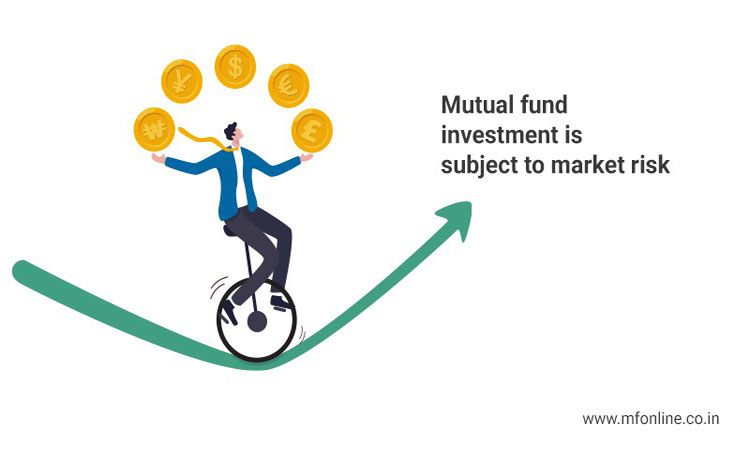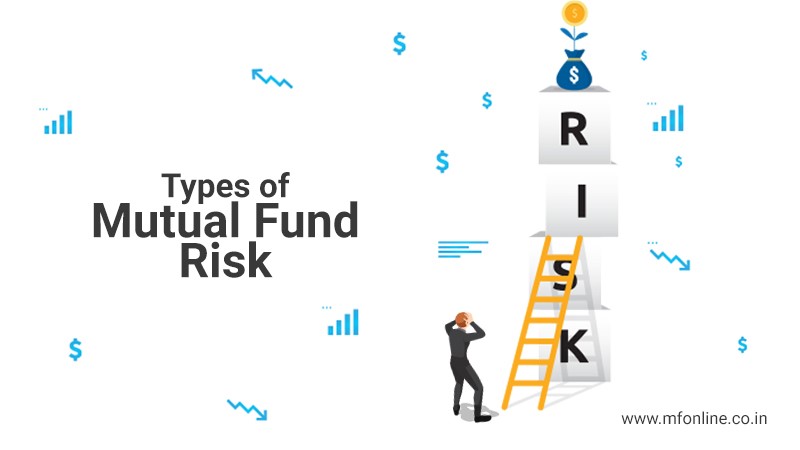Are Mutual Fund Investments subject to market risk
21 December 2021
This blog discusses the disclaimer 'Mutual fund investments are subject to market risk; please read the offer document carefully before investing. We are sure you must have read that or heard it in every advertisement of the mutual fund. So let us learn everything about what it means.
No investment is risk-free. Though Mutual funds offer a broader diversification and value for money to an individual, a few risks are associated with mutual fund investment. Every investment is subject to market risk. We say this because no one can predict the future. For example, no one can judge when the value of the given asset will increase or decrease. Like all securities, mutual fund investments are also subject to market risk because the market cannot be accurately predicted or wholly controlled.
What is a Market Risk?
But first of all, let us understand what a risk is? In simplistic words, it indicates an unexpected outcome. Risk is an integral part of our lives, and there is risk in even the most mundane tasks such as driving to work every day or every little thing we do. Similarly, when it comes to investments, the risk is unavoidable. Individuals invest money for the sole motive to generate profit. For example, you assume that present investments might benefit in the future when you invest in gold, real estate, or shares. But the market fluctuation owing to various factors can lead the prices going down just after you buy it. As a result, the prices move in the opposite direction than expected. That is a risk involved in investments when you cannot anticipate. Let's take a closer look at the various risks you are exposed to as an investor, how mutual funds are subject to market risk, and how you can manage them.
Risks Associated with Mutual Funds
Now that we have discussed what risk is in general let us consider the risks associated with investing in mutual funds. While mutual funds have many advantages- from the power of pooled investment resources to professional portfolio management- they are subject to the same market and economic forces that all investments face. As a result, an investor can learn more about them and practice ways to cushion them.
Due to various factors, mutual funds are subject to market risk since an investor places money in a range of investment instruments like debt, equity, corporate bond, and government securities. However, it mainly happens due to fluctuation in NAV of the assets. Other factors contributing to market risks are natural disasters like COVID, inflation, political unrest, etc. Due to which the investor may be subjected to loss.
Types of Risks in Mutual Funds

Mutual fund risk can be categorized into systematic risk and unsystematic risk. Following are the types of risks associated with mutual funds.
Concentration Risk
When the interest rate varies in this type of risk, it haunts the investor until the end of the investment horizon. Debt funds like corporate bonds, government securities are most affected by changes in interest rates. This is because interest rates change depending on the credit available with lenders and the demand from the borrower. Therefore, it is inversely related to each other. Let us explain this better with the help of an example: when the interest rate increases, the price of the bond decreases, which in turn decreases the value of the bond.
Liquidity Risk
Mutual fund investments are subject to market risk, and liquidity risk is one of them. It refers to the difficulty of redeeming the investment as and when suitable to the investor without incurring a loss in the value of the investment. Thus, for example, ELSS comes in with a rigid lock-in period which abstains the investor from redeeming the investment when he might need it the most.
The best way to avoid any liquidity risk is by diligently selecting the fund. Investments are for-profit and can also be used as an emergency fund if the investor goes through any financial slump.
Credit Risk
Credit risk indicates that the scheme issuer is not in a position to pay the interest as pledged. Therefore, in debt funds, high-grade investments with high ratings are incorporated by the fund manager. But sometimes, to enhance the rate of return, the fund manager may include lower credit-rated securities. Therefore, before investing in debt funds, take a look at the ratings given by the credit rating agencies.
The risks, as mentioned above, clearly explain the disclaimer ‘Mutual funds investments are subject to market risk. The purpose of this disclaimer is to comply with a statutory mandate aimed primarily at communicating the risks associated with mutual funds schemes.
Further, let us throw some more light on how to combat these risks. By using these recommendations, the effects of mutual fund risks can be successfully mitigated.
Risk Management Tips Through Mutual Fund
Build A Portfolio That Matches Your Investment Goal
The first and foremost way to minimize the most significant risk of mutual funds is to invest in a profile that corresponds to the risk-taking capacity of the investors. Therefore, before choosing a particular mutual fund scheme, factors such as age, financial standing, risk aptitudes, and financial objectives need to be considered. For example, those with a low-risk appetite and long-term financial objective will appreciate a well-balanced portfolio that combines debt and equity.
Invest Through Systematic Investment Plan
Investors can disperse the risk burden substantially via SIPs. In addition, investing in small amounts at regular intervals for a longer duration can get you good returns. Finally, the power of compounding will help an investor to grow money substantially over the years.
Diversify Your Portfolio
As the saying goes, do not put all of your eggs in one basket. That proverb stands true in mutual funds. Instead, allocate investments across debt and equity, considering your risk appetite and investment horizon.
Frequently Asked Questions
Why Are Mutual Funds Subject to Market risk?
Mutual funds, like other assets, are exposed to market or systemic risk. Because there is no way to foresee what will happen or if the value of a specific asset will rise or decline, and as the market is not predictable, there is no risk-free investing. The future is uncertain for all investments; no investment is risk-free.
Disclaimer: All mutual funds are subject to market risk. Read all scheme-related documents carefully.



